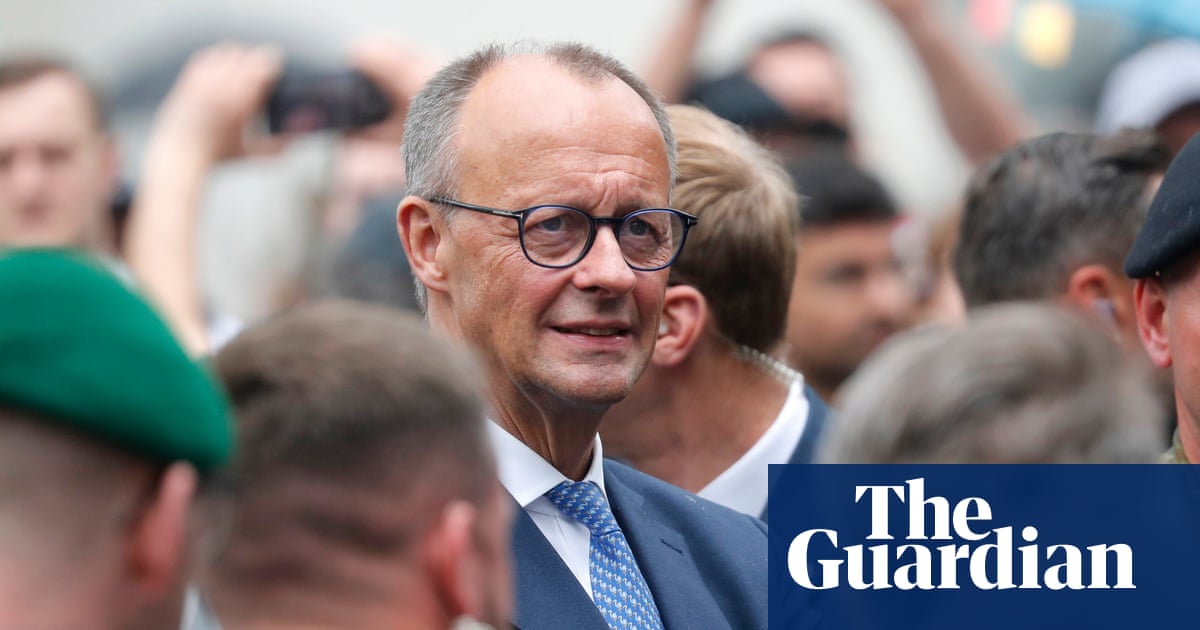The German chancellor has visitedLithuaniato mark Berlin’s first permanent foreign troop deployment since the second world war, as he called on allies to dramatically expand their efforts to bolster European defences against a hostile Russia.
As a crowd waved Lithuanian, German and Ukrainian flags,Friedrich Merzand his defence minister, Boris Pistorius, attended a ceremony launching the official formation of an armoured brigade aimed at protecting Nato’s eastern flank.
The new heavy combat unit, the 45th tank brigade, will comprise 4,800 German soldiers and 200 civilian staff. It was announced in response to Russia’s full-scale invasion ofUkrainein 2022 and is scheduled to reach full operational capacity by 2027.
Merz said: “Together with our partners, we are determined to defend the alliance territory against any aggression. The security of our Baltic allies is also our security.”
The deployment, unprecedented for the Bundeswehr, is aimed at shoring up the defence of Lithuania and fellow Baltic republicsEstoniaand Latvia, former Soviet states that have become Nato and EU members and which fear a Russian attack.
At a news conference in Vilnius with Lithuania’s president,Gitanas Nausėda, Merz said “Russia’s aggressive revisionism” seeking to redraw the European map created grave security risks for the entire continent, not just Ukraine.
Merz, the first chancellor to have himself served in the Bundeswehr, said: “We stand firmly by Ukraine but we also stand together as Europeans as a whole and we play, whenever possible, as a team with the US.”
In the build-up to aNatosummit next month in The Hague, Merz said the alliance must “sustainably strengthen European defence capabilities and our defence industry must expand its capabilities – it has to produce more for Europe and produce more in Europe”.
Nausėda thanked Merz for Germany’s show of support with the new combat unit formed at the request of Lithuania, which with its 2.9 million inhabitants borders Russia’s Kaliningrad exclave and Moscow-allied Belarus.
He said: “We understand the threat and believe that we can face up to the threat with our allies,” noting that Lithuania planned to reach a new Nato goal of spending 5% of gross domestic product on defence by next year.
Merz said Germany, as Europe’s biggest economy, would reach the same benchmark by 2032 based on a calculation of 3.5% of GDP for military procurement and 1.5% for infrastructure of military relevance including roads, bridges and ports.
Merz’s muscular rhetoric has been welcomed by European partners as a continuation and expansion of theZeitenwende(turning point) in defence policy set out by his predecessor Olaf Scholz.
While Scholz’s centre-left-led government created a€100bn (£84bn) special fundto buy defence equipment and eventually met a Nato commitment of defence spending of 2% of GDP, Merz has moved torelease the constitutional debt braketo allow far more military investment.
In his first significant speech to parliament last week, Merz vowed after years of neglect to build up Europe’s “strongest conventional army”. Germany has no nuclear weapons of its own.
The German chancellor said: “This is appropriate for Europe’s most populous and economically powerful country. Our friends and partners also expect this from us. Indeed, they practically demand it.”
Sign up toHeadlines US
Get the most important US headlines and highlights emailed direct to you every morning
after newsletter promotion
Pistorius, who was also defence minister under Scholz, pledged when the new government took over this month that Germany would be “ready to defend every square inch of Nato territory” and called the Lithuania brigade “a clear signal to any potential adversary”.
Donald Trump has strong-armed fellow Nato members to boost military spending, often singling out Germany inhis accusations of European “freeloading”at Washington’s expense.
The US president has also troubled European allies with conflicting messages on his stance toward Ukraine’s defence, while raising fears about the US commitment to Nato’s mutual defence clause.
Asked about reports Trump could order a draw-down from the continent, Merz said on Thursday he had “no indication that the US would withdraw troops from Europe”.
The commitment to Baltic security has posed several challenges for Germany, including finding enough personnel willing to serve there. In January, the Bundestag passed legislation to make the prospect more attractive, including more flexible working hours and increased allowances and overtime pay.
Before Merz’s visit, Lithuania’s defence minister, Dovilė Šakalienė, told Germany’s Frankfurter Allgemeine newspaper how crucial plausible deterrence towardRussiawas, sharing Pistorius’s assessment that Russia could be in a position to attack a Nato state within five years.
She said: “Every Lithuanian knows: if the Russians come, no one will be spared.”
